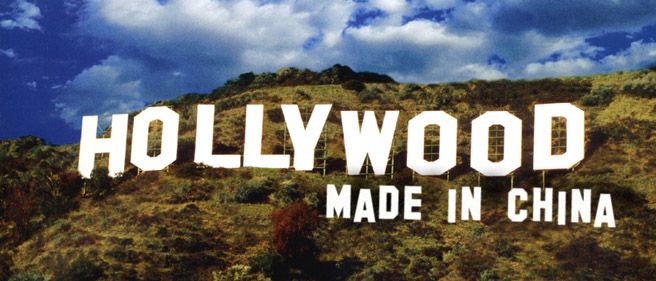
Media industry analysts have warned that Hollywood has become so awash with Chinese funding that China now essentially owns and controls most of the Hollywood entertainment industry.
A Beijing-based purchase of US film studio Legendary Pictures by Dalian Wanda Group represents the largest-ever film industry takeover by a Chinese company, with $3.5 billion spent on allowing China to become the second biggest box officer player in Hollywood.
Yahoo News reports:

BYPASS THE CENSORS
Sign up to get unfiltered news delivered straight to your inbox.
You can unsubscribe any time. By subscribing you agree to our Terms of Use
Legendary, the maker of “Jurassic World,” “Godzilla” and the latest Batman trilogy, has grossed more than $11 billion worldwide since it was founded in 2005, mostly with the kind of big-budget blockbusters popular with Chinese audiences.
“It’s a win-win situation… because the China market is really incredibly taking off and Hollywood has a real interest in that,” Stanley Rosen, a political science professor at the University of Southern California, told AFP.
It is an arrangement that benefits both sides financially, with movies becoming increasingly expensive to produce but the Chinese hungry for Western-made films.
But China, which has yet to make a global hit, is also buying expertise.
“Hollywood has what China lacks, which is storytelling ability, marketing, distribution,” Rosen told AFP.
Wanda owner Wang Jianlin, who burst into the international spotlight in 2012 by buying US cinema chain AMC Entertainment for $2.6 billion, says the Legendary deal makes his company the highest revenue-generating movie unit in the world.
It also gives future Legendary films direct access to China’s booming market, which has become crucial to foreign filmmakers, with North American ticket sales stagnant.
PricewaterhouseCoopers has projected China’s box office to rise from $4.3 billion in 2014 to $8.9 billion in 2019, meaning it would outstrip the US within two years.
– Phenomenal growth –
In 2014, 8,035 movie screens — 22 per day — were installed in China and the screen count stood at 31,627 by the end of 2015, according to official sources.
Underlining the shift in power, Chinese box office monitor EntGroup announced that cinemas took a record $1.1 billion in February — a 70 percent year-on-year jump — overtaking the North American monthly revenue for the first time in history.
The main driver of Chinese cinema’s phenomenal growth is a steady emergence of a modern consumerist lifestyle among China’s burgeoning middle class, expected to account for 75 percent of households within a decade.
Cumulative Chinese investment in the US since 2000 reached $63 billion in 2015, with a $4 billion going to the entertainment industry, according to research firm Rhodium Group.
The trend looks set to accelerate, with Huayi Brothers planning to produce at least 18 films with LA studio STX Entertainment, and Shanghai-based Fosun International taking a stake in US media company Studio 8.
Both Wanda and tech firm Alibaba have been touted as possible minority investors in Paramount, while Hunan TV has signed a $1.5 billion deal to fund Lionsgate movies and Perfect World Pictures is investing $250 million in Universal’s slate over five years.
Beijing has pushed back against an invasion of “foreign culture,” however, issuing an edict in 2011 discouraging movies featuring “fantasy” and “time travel” among other “bizarre plots.”
President Xi Jinping has instructed artists to abandon “naive sensual amusement” and instead promote “true-to-life images to tell people what they should affirm and praise.”
Only 34 foreign films are given cinema releases in China each year under a quota set by Beijing, and all are subject to official censorship over content deemed politically sensitive or obscene.
– Litmus test –
Co-produced movies can bypass the quota as long as they contain significant Chinese elements, such as characters, plot devices or locations.
But the strategy has backfired at times, most notably with “Transformers: Age of Extinction,” which was derided for depicting characters drinking the Chinese version of Red Bull in Texas.
Jonathan Landreth, managing editor of the New York-based online magazine China File, warned in a recent article that Wanda and Legendary were operating under Jinping’s “looming encouragement” and said the deal could not have gone ahead without the approval of China’s Communist Party.
“While Wanda invests in Hollywood to make money, the deal sees Legendary unwittingly becoming one of the most powerful channels for Beijing’s worldview, a worldview that bars open discussion of the jailing of dissidents and the disappearing of booksellers,” he wrote.
The first co-production from the Wanda-owned Legendary will be the $150 million sci-fi action movie “The Great Wall,” starring Matt Damon, Willem Dafoe and Hong Kong Cantopop singer and actor Andy Lau.
Directed by Chinese filmmaker Zhang Yimou and due for its China release in December, two months ahead of the US opening, the film will be entirely English-language.
Christopher Spicer, a film financing expert and partner at international law firm Akin Gump, said the film, the most expensive ever shot in China, could serve as a litmus test of public appetite for Chinese-American joint projects.
“I’ve been doing film and television for eight or nine years and at different times in history primary funding sources of film and, to a lesser extent, television have come from different countries all over the world,” he told AFP.
“But certainly for the time being I would expect the trend of Chinese financing to continue.”


